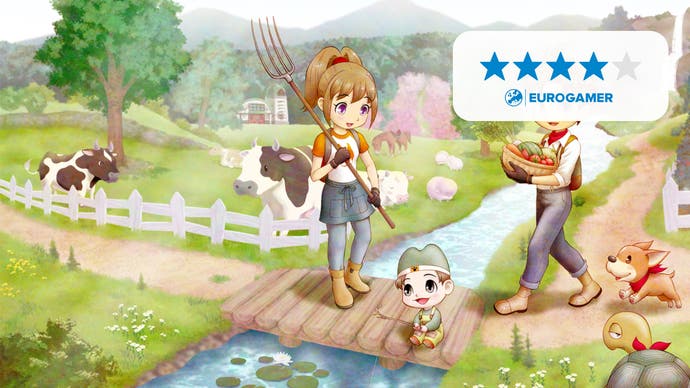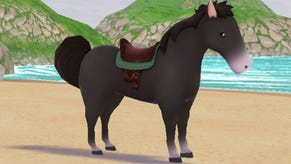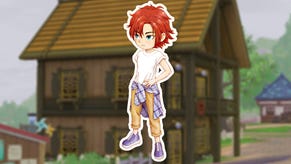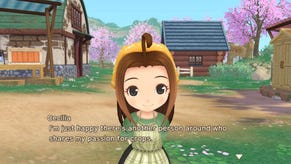Story of Seasons: A Wonderful Life review - a heartwarming return to a classic farming sim
Nurture nature.
The first game whose release I ever truly counted down the days to was Harvest Moon: A Wonderful Life. Sure I had patiently waited for Pokémon Ruby and Sapphire to arrive, but I didn't tick off every day on a chart before going to bed. Nor did I get in trouble for blue tacking said chart to my bedroom wall and, upon removing it, accidentally pulling off some of the paint. I had just started reading gaming magazines at the time as well, and every article I read about the game only made my excitement blossom further. Sadly, in my enthusiasm, I got the North American and European release dates confused, so, when I arrived at my local Game, I discovered I still had another week to live through.
After a week which felt like a year, I found myself swept into A Wonderful Life's world; spending hours caring for my animals, foraging and befriending the locals. To this day, Harvest Moon: A Wonderful Life for the GameCube remains one of my favourite farming simulators.
Before we count our chickens with Story of Seasons: A Wonderful Life though, there are a few important details to go over. First, you probably noticed that the game series' name changed during those previous paragraphs. This is because in 2014, Marvelous, the original developer, started using its own publishing brand, XSeed Games, having discontinued its licensing agreement with original publisher Natsume two years earlier. Natsume, however, maintained the rights to the Harvest Moon title and continues to publish games under it - hence the split.
Second, Story of Seasons: A Wonderful Life is in fact the third remake of the original game, released on the GameCube outside of Japan in 2004. Harvest Moon: A Wonderful Life Special Edition for the PlayStation 2 was the first attempt, released in 2005 outside of Japan and introducing a variety of new features. This game would go on to have its own PlayStation 3 and 4 remaster soon after, but Marvelous didn't stop there, shortly releasing Harvest Moon: Another Wonderful Life, where the player character is now a woman. All this not forgetting how both the setting and most of the NPCs were also reused in Harvest Moon DS and Harvest Moon DS Cute.
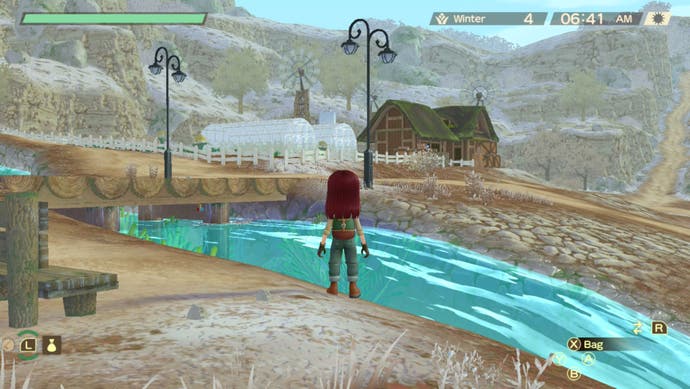
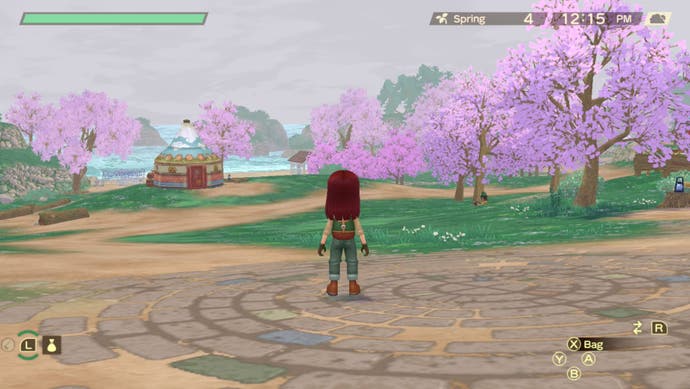
Using the GameCube version as its foundations, Story of Seasons: A Wonderful Life grabs elements from its many past remakes, tosses them into a mixing bowl alongside new features, and bakes them into something which could easily be called the ultra deluxe version of the game. The question, especially for someone like me who adored the original, is whether this has built a farm with fertile soil or one with ground so hard you couldn't dig it up to bury a body.
The overall flow of A Wonderful Life remains the same as the original: in true farming simulator tradition, you inherit a farm in Forgotten Valley from your dead father and are then tasked with turning it into a thriving business, alongside raising a family. Thankfully the farming mechanics - the things you'll spend most of your time doing - remain enjoyable, with most of the changes being centred around making your farm easier to run without sacrificing their hidden complexity. This includes placing path tiles around trees to prevent you from accidentally planting crops at their roots, useful new facilities like the fertiliser maker and letting you ship crops straight away from the very beginning rather than having to unlock this feature.
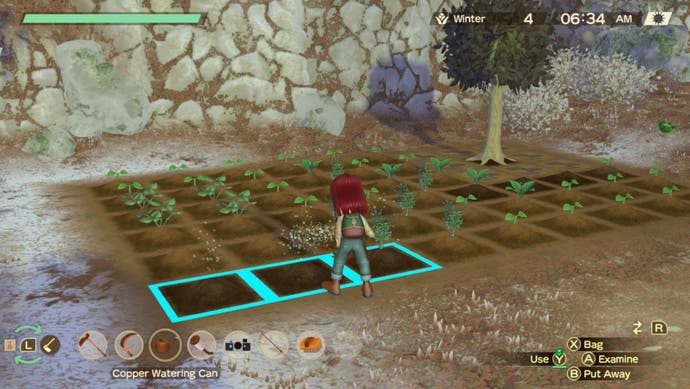
Growing crops is a task that, on the surface, looks quite simple, but becomes more complex when you dig into the details. Aside from Sweet Potatoes and trees, each base crop can be grown in multiple seasons and, since some can take a while to grow, you need to pay attention to this overlap or else you'll end up with a field of dead plants. Eventually, you'll unlock the ability to create hybrid crops and this is where the plant-based fun truly begins.
By combining different crops together, you can grow a variety of strange looking fruits and vegetables - from Tocarro to Berrymelos - these can be sold at higher prices and used to cook new meals. Various flowers growing around the valley can also be used to further upgrade crop seeds, such as allowing them to be grown in any season. Experimenting with crops to discover what you can create is great fun and broadens what can start feeling like a daily chore.
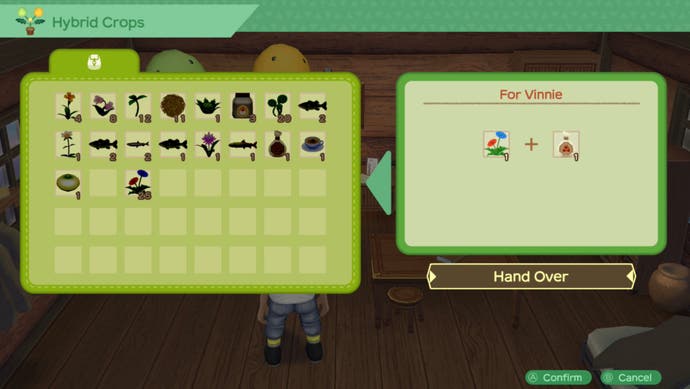
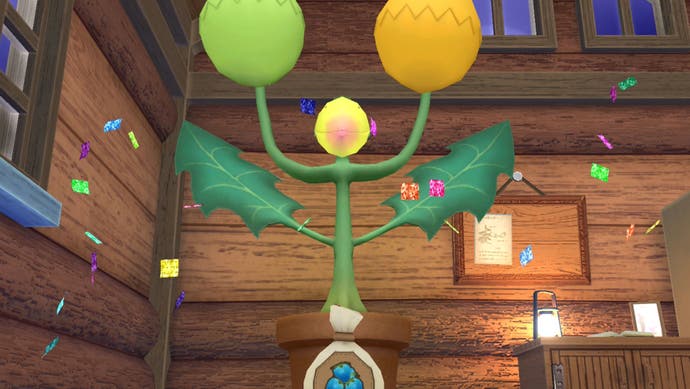
When it comes to the animals you can raise, returning players will be happy to learn that goats don't stop producing milk anymore, so there's no need to commit tactical goat murder. No animal, in fact, can get sick or die in the remake, firmly removing the urge to run home at the smallest spot of rain, since the only penalty you might receive is a downgrade to their produce quality.
This simplification of animal care extends to the cows, as you no longer have to breed them to ensure they continue producing milk. While certain parts of this mechanic remain - cows will only produce milk specifically for their calves for the first few days after their birth, and will give more milk for the following 20 days - having its specific purpose removed does feel like the remake has lost an important aspect of farm management. Though it does slightly redeem itself by including the chicken coop bell, which automatically moves your birds inside or outside. I don't want to know how many hours of my life have been spent taking chicken in and out of that building in the GameCube version.
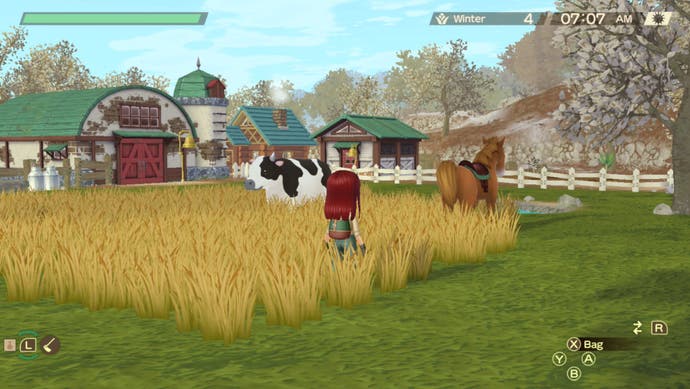
The farm isn't the only place impacted by the remake's changes - a number of the NPCs have been reworked as well. Some, like Muffy who is now called Molly, have had their names changed as, according to the first XSeed Games localisation blog, they 'did not closely adhere to the names in the Japanese version.' Others, like Matthew (formerly called Marlin), have had their appearance redesigned as well. While their personalities do mostly remain intact, there is one character rework which does stand out.
Amongst the farmers, inn owners and artists who inhabit the original A Wonderful Life, there is one character who never seemed at home in the valley - Murrey the homeless man. Accompanied by flies and implied alcoholism, Murrey could often be found begging and, while his reimagining still asks for money, he has been redesigned into a man-of-the-wilds. Renamed Pui, his rags have been replaced with a grass tunic, the flies have transformed into butterflies, and he's considerably cleaner. While Murrey had his fans, I personally welcomed the change as, to me, he always felt like a negative representation of a homeless person. Pui's inclusion highlights how the developers were focused on fixing the issues from the original and, while it can be argued he could have been removed entirely, it shows their dedication to recreating every aspect of the game.
Alongside these new character designs, it's also easier to build friendships in the remake. You can now track every friendship level and the map serves a proper purpose, allowing you to see where every NPC is in the valley. This means you can easily track down a character and shove a gift in their face whenever you like. It's also possible to give characters more than one gift per day as long as it's not the same gift; they won't, for example, accept two of the same flower in one day. This is incredibly useful for unlocking new events and items, not to mention marriage.
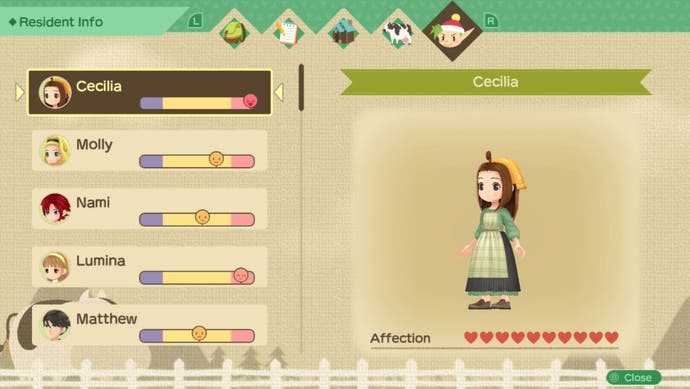
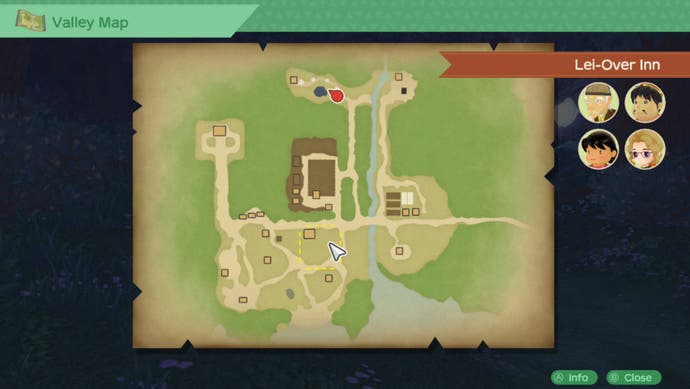
There are eight marriage candidates - four women, four men - to choose from and, unlike many instalments in the Story of Seasons series, marriage is essential to progression. If you do decline married life, well, that's game over for you and you'll depart from the valley, your farming dreams forgotten. Thankfully, it's always possible to return to your last save file and there's always someone willing to marry the anti-social farmer - be it the crop loving Cecilia or musical Lumina - so your hard work won't be lost. The remake also includes same-sex relationships, which is perfect for LGBT+ players like myself who long for representation especially when a romantic relationship is so crucial to gameplay. This, alongside the inclusion of non-binary pronouns and player customisation, helps you create the protagonist you wish to be and, in doing so, build a sense of immersion.
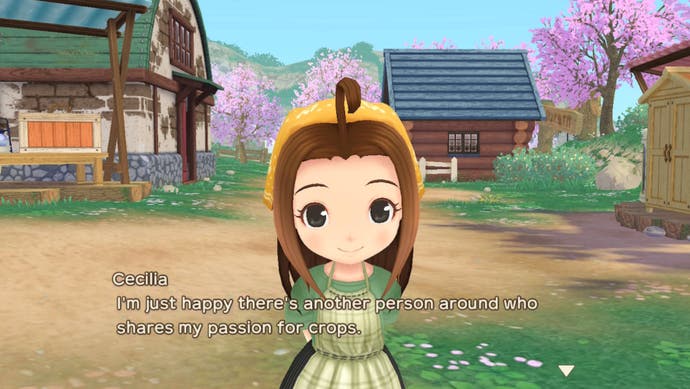
After choosing your future spouse, focus moves to raising your child and here A Wonderful Life deviates from the Story of Seasons norm once again as, rather than your child simply becoming an immortal toddler, you'll experience their growth into adulthood. During their life, your child can gain experience in six different interests spanning from farming to athletics, which will eventually decide their future career. A variety of factors help determine their interests, including your choice of spouse and the friends you make, leaving you to either influence their career or simply watch them develop independently.
While the level of interest your child has in each career was a rather hidden mechanic in the original game, the remake allows you to see which one they prefer via the friendship menu. It's another small but useful change, especially if you want to guide them down a specific career path. The various careers your child can have also adds to the game's replayability, as you may find yourself wanting to marry someone else to discover how their child might turn out.
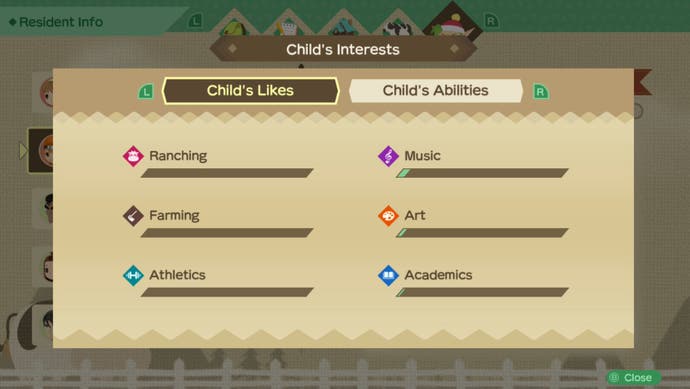
Outside of reworking parts of the farming and NPC mechanics, the most notable change the developers made was shortening each of the main six story chapters to a year. This decision both prevents the main story from dragging and impacts one of the most precious resources in any farming simulator - time.
A Wonderful Life does strike a good balance of ensuring you have enough time each day to do something outside of farmwork. Yet, the shorter years and ten-day-long seasons put more emphasis on your day-to-day. You can't, for example, spend all day digging up artefacts and visit Van the merchant, as his shop hours overlap with when the dig site is open. Over time you develop a routine, but it's important to change it once in a while to prevent the game from feeling too repetitive. One way you can do this is by completing requests - small side quests tasking you with finding a specific item. Requests are worth completing as the rewards they offer, like seeds, can come in handy on the farm.
What I was worried the remake would lose is the undercurrent of sorrow which often emerged in the original game. Thankfully, though it's a little hidden beneath the cartoon-style graphics, that melancholy is still there. It lives in how the valley changes throughout the year; watching the early snow in late autumn or grass browning as summer departs. It can be found in how the characters change as the chapters flow by - children grow up, adults grow old. How, as you become closer to the characters, you realise that they're living their own lifes beset by their own troubles. One resident becomes consumed by grief, while, if you don't marry Molly, she comes to lament her lack of family and she's not the only person trapped in a state of unrequited love. As much as the game is about living a wonderful life, many of the small stories you encounter are themed around lost or unreturned love.
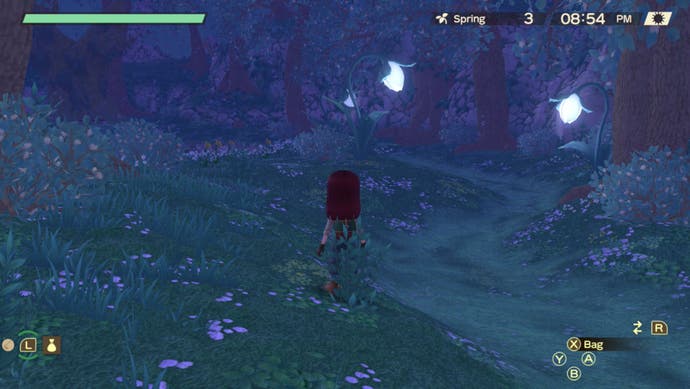
Not all is ripe tomatoes in the A Wonderful lIfe remake though. Fishing can become dull, especially when compared to other farming sim, as it remains a wait-before-button-smashing experience. There's a small number of glitches to contend with, such as pieces of scenery popping into existence at times or how, in the dig site, you can't excavate in a tile when an NPC is standing next to it. It's also less mechanically in-depth when compared to more modern farming simulators, such as how you can only process your crops into meals, fertiliser or seeds rather than a wider range of items like juice or wine.
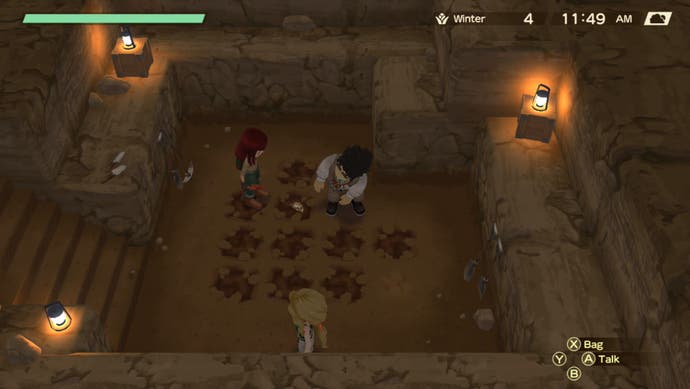
By looking back at the past remakes while including new features, though, Story of Seasons: A Wonderful Life succeeds in both recreating the spirit of the original and elevating the gameplay. It continues to be a comforting blend of storytelling, farming mechanics and character interaction wrapped in a bittersweet world, which are all assisted by how the changes focus on improving the experience rather than being unnecessary additions. Maybe this time I'll finally raise a child who takes over the farm.
